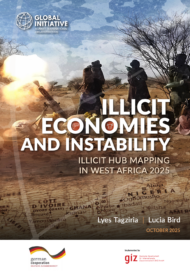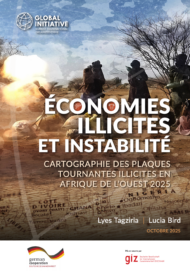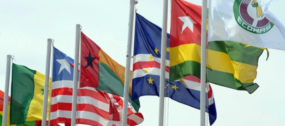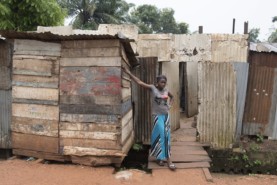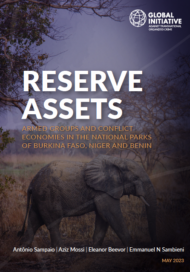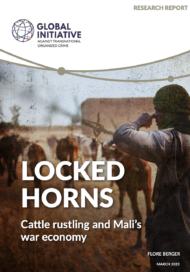CLICK HERE TO ACCESS THE INTERACTIVE MAP
Are you a journalist? Access the Media kit here
West Africa is a region marked by profound economic dynamism but persistent insecurity. Over the past five years, a complex mosaic of conflicts, weak governance and armed group activity has created an environment in which illicit economies have thrived. Banditry, kidnappings and organized criminal activity have become increasingly prevalent in Nigeria, the Sahel and beyond. Cross-border illicit ecosystems bind together crime and conflict across the region, while political divides have stymied collaboration and created a volatile landscape in which civilians, states and non-state actors constantly negotiate control, resources and authority.
This report presents the findings of the 2025 illicit hub mapping in West Africa, providing an updated snapshot of illicit economy dynamics across the region. It also analyses the findings of the Illicit Economies and Instability Monitor (IEIM), an expert-led tool that offers a quantitative assessment of how illicit economies fuel violence and instability. The IEIM assigns each identified hub a score and classification, identifying those in which illicit economies play the greatest role as drivers of conflict and insecurity.
Drawing on over 700 interviews and continuous monitoring, the report maps 350 illicit hubs across 18 countries, spanning West Africa and parts of Central Africa. The research shows that one in five hubs play a significant role as vectors of conflict, violence and instability, with most concentrated in the Sahel, Central Africa and northern Nigeria. Illicit economies in a smaller number of hubs in the northern areas of littoral states play a material but not significant role, while the majority, particularly in coastal states, have a more limited link to instability.
Five specific illicit economies – kidnapping, cattle rustling, the illicit arms trade, the illicit gold trade, and extortion and protection racketeering – are particularly significant in shaping the regional conflict landscape. Referred to as “accelerant markets,” these economies intensify instability where armed groups expand into new territories or entrench themselves in existing ones. The report finds that armed groups not only use illicit economies for financing and resources but also to build legitimacy among local communities. This both strengthens their operations and erodes trust in formal institutions, posing long-term threats to state control.
By revealing granular, subnational dynamics, the 2025 illicit hub mapping provides policymakers, law enforcement, and analysts with a clear picture of the intersections between crime and instability. The report and accompanying interactive online tool offer evidence-based insights to guide interventions that target the most significant geographies and economies, from gold sector formalization and cattle sector regulation to supporting communities living near areas exploited by armed groups.
About the project
This research is delivered by the GI-TOC as part of the ‘Support to the Mitigation of Destabilizing Effects of Transnational Organised Crime (M-TOC)’. The M-TOC project is a project commissioned by the German Federal Foreign Office, implemented by Deutsche Gesellschaft für Internationale Zusammenarbeit (GIZ) GmbH, and the GI-TOC, from 2024 to 2025. The project aims to map regional illicit markets in West Africa in order to improve the evidence base for stabilisation and peacebuilding interventions, and to strengthen the engagement of civil society and state actors in the fight against criminal markets.
Live interpretation will be available in English and French.
Cartographie des plaques tournantes illicites en Afrique de l’Ouest – 2025
Vous êtes journaliste ? Accédez au kit média ici
L’Afrique de l’Ouest est une région marquée par un profond dynamisme économique mais une insécurité persistante. Au cours des cinq dernières années, une mosaïque complexe de conflits, de gouvernance faible et d’activités de groupes armés a créé un environnement dans lequel les économies illicites se sont épanouies. Le banditisme, les enlèvements et la criminalité organisée sont devenus de plus en plus répandus au Nigeria, au Sahel et au-delà. Des écosystèmes illicites transfrontaliers lient la criminalité et les conflits à travers la région, tandis que les divisions politiques ont freiné la coopération et créé un paysage volatile dans lequel civils, États et acteurs non étatiques négocient en permanence le contrôle, les ressources et l’autorité.
Ce rapport présente les conclusions de la cartographie des pôles illicites 2025 en Afrique de l’Ouest, offrant un aperçu actualisé de la dynamique des économies illicites dans la région. Il analyse également les résultats de l’Illicit Economies and Instability Monitor (IEIM), un outil dirigé par des experts qui fournit une évaluation quantitative de la manière dont les économies illicites alimentent la violence et l’instabilité. L’IEIM attribue à chaque pôle identifié un score et une classification, permettant d’identifier ceux dans lesquels les économies illicites jouent le rôle le plus important en tant que moteurs de conflit et d’insécurité.
S’appuyant sur plus de 700 entretiens et une surveillance continue, le rapport cartographie 350 pôles illicites répartis dans 18 pays couvrant l’Afrique de l’Ouest et certaines parties de l’Afrique centrale. La recherche montre qu’un pôle sur cinq joue un rôle important en tant que vecteur de conflit, de violence et d’instabilité, la majorité étant concentrée au Sahel, en Afrique centrale et dans le nord du Nigeria. Dans un nombre plus restreint de pôles situés dans les zones septentrionales des États côtiers, les économies illicites jouent un rôle matériel mais non déterminant, tandis que la majorité, en particulier dans les États côtiers, entretient un lien plus limité avec l’instabilité.
Cinq économies illicites spécifiques — les enlèvements, le vol de bétail, le commerce illicite des armes, le commerce illicite de l’or, ainsi que l’extorsion et le racket de protection — jouent un rôle particulièrement important dans la configuration du paysage conflictuel régional. Désignées comme des « marchés accélérateurs », ces économies intensifient l’instabilité lorsque des groupes armés s’étendent vers de nouveaux territoires ou s’enracinent dans ceux qu’ils contrôlent déjà. Le rapport constate que les groupes armés utilisent les économies illicites non seulement pour financer leurs opérations et s’approvisionner en ressources, mais aussi pour asseoir leur légitimité auprès des communautés locales. Cela renforce leurs capacités opérationnelles tout en sapant la confiance dans les institutions officielles, constituant ainsi une menace à long terme pour le contrôle étatique.
En révélant des dynamiques fines et infranationales, la cartographie 2025 des pôles illicites fournit aux décideurs, aux forces de l’ordre et aux analystes une vision claire des intersections entre criminalité et instabilité. Le rapport et l’outil interactif en ligne qui l’accompagne offrent des informations factuelles pour orienter les interventions visant les géographies et économies les plus déterminantes, qu’il s’agisse de la formalisation du secteur aurifère, de la régulation du secteur de l’élevage ou du soutien aux communautés vivant à proximité des zones exploitées par des groupes armés.
À propos du projet
Cette recherche est menée par la GI-TOC dans le cadre du projet « Support to the Mitigation of Destabilizing Effects of Transnational Organised Crime (M-TOC) ». Le projet M-TOC est commanditée par le ministère fédéral allemand des Affaires étrangères, et mise en œuvre par la Deutsche Gesellschaft für Internationale Zusammenarbeit (GIZ) GmbH et la GI-TOC, de 2024 à 2025. Le projet vise à cartographier les marchés illicites régionaux en Afrique de l’Ouest afin d’améliorer la base de connaissances pour les interventions de stabilisation et de consolidation de la paix, et de renforcer la participation de la société civile et des acteurs étatiques dans la lutte contre les marchés criminels.
Une interprétation simultanée sera disponible en anglais et en français
Mapeamento de centros de atividade ilícita na África Ocidental – 2025
A África Ocidental é uma região marcada por um profundo dinamismo económico, mas também por uma insegurança persistente. Nos últimos cinco anos, uma complexa combinação de conflitos, fraca governação e atividade de grupos armados criou um ambiente no qual as economias ilícitas prosperaram. O banditismo, os raptos e a criminalidade organizada tornaram-se cada vez mais comuns na Nigéria, no Sahel e para além destas fronteiras. Ecossistemas ilícitos transfronteiriços ligam o crime e o conflito em toda a região, enquanto divisões políticas dificultam a colaboração e criam um cenário volátil no qual civis, Estados e atores não estatais negoceiam constantemente o controlo, os recursos e a autoridade.
Este relatório apresenta as conclusões do mapeamento dos centros de atividade ilícita de 2025 na África Ocidental, oferecendo uma visão atualizada da dinâmica das economias ilícitas na região. Também analisa os resultados do Illicit Economies and Instability Monitor (IEIM), uma ferramenta liderada por especialistas que fornece uma avaliação quantitativa sobre como as economias ilícitas alimentam a violência e a instabilidade. O IEIM atribui a cada centro identificado uma pontuação e uma classificação, identificando aqueles em que as economias ilícitas desempenham o papel mais significativo como motores de conflito e insegurança.
Com base em mais de 700 entrevistas e num acompanhamento contínuo, o relatório mapeia 350 centros de atividade ilícita em 18 países, abrangendo a África Ocidental e partes da África Central. A pesquisa mostra que um em cada cinco centros de atividade ilícita desempenha um papel significativo como vetor de conflito, violência e instabilidade, com a maioria concentrada no Sahel, na África Central e no norte da Nigéria. Um número menor de centros de atividade ilícita, localizados no norte dos Estados costeiros, apresenta economias ilícitas com um impacto material, embora não determinante, enquanto a maioria — especialmente nos Estados costeiros — mantém uma ligação mais limitada com a instabilidade.
Cinco economias ilícitas específicas — raptos, roubo de gado, tráfico ilícito de armas, comércio ilícito de ouro e extorsão e cobrança ilegal de “proteção” — têm um papel particularmente importante na configuração do cenário regional de conflito. Conhecidas como “mercados aceleradores”, estas economias intensificam a instabilidade quando grupos armados se expandem para novos territórios ou se consolidam nas áreas onde já atuam. O relatório conclui que os grupos armados utilizam as economias ilícitas não apenas para obter financiamento e recursos, mas também para construir legitimidade junto das comunidades locais. Isso fortalece as suas operações e, ao mesmo tempo, enfraquece a confiança nas instituições formais, representando uma ameaça de longo prazo ao controlo do Estado.
Ao revelar dinâmicas granulares a nível subnacional, o mapeamento de centros de atividade ilícita de 2025 fornece aos decisores políticos, às forças de segurança e aos analistas uma visão clara das intersecções entre criminalidade e instabilidade. O relatório e a ferramenta interativa online que o acompanha oferecem informações baseadas em evidências para orientar intervenções direcionadas às geografias e economias mais significativas — desde a formalização do setor do ouro e a regulamentação do setor pecuário até ao apoio às comunidades que vivem próximas de áreas exploradas por grupos armados.
